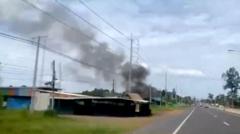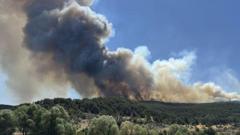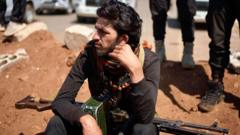The conflict leaves at least 12 dead, prompting border closures and evacuations as both nations brace for further violence.
Tensions Rise as Military Clashes Kill 12 Along Thailand-Cambodia Border

Tensions Rise as Military Clashes Kill 12 Along Thailand-Cambodia Border
Fighting between Thai and Cambodian troops escalates an age-old territorial dispute.
Clashes along the contested Thailand-Cambodia border have resulted in the deaths of at least 12 individuals, primarily civilians, according to reports from Thai officials. This significant outbreak of violence highlights the escalating tensions between the two neighboring countries, rooted in long-standing territorial disputes that can be traced back over a century.
Most casualties have been recorded among civilians from three provinces in Thailand, with the military reporting additional injuries. Meanwhile, Cambodia has not yet confirmed any casualties on its side. The hostilities began early Thursday, with both nations accusing each other of igniting the conflict. Thailand specifically claims Cambodia initiated hostilities by launching rockets, prompting Thai airstrikes on Cambodian military positions.
In response to the clashes, Thailand has closed its border, while Cambodia has chosen to downgrade diplomatic relations, accusing Thailand of excessive military force. Both governments are urging citizens in border zones to evacuate. Reports indicate that approximately 40,000 civilians from the Thai side are being relocated to safer areas. A local resident reported serious conditions as evacuation efforts are underway.
The fatalities reported by Thai authorities include 11 civilians, ranging from an eight-year-old girl to a 15-year-old, in addition to one military personnel member. Divergent accounts from both countries indicate a complex escalation, with Thailand asserting that tensions flared after Cambodian forces used drones for surveillance. Conversely, Cambodia alleges that the conflict started when Thai troops encroached upon a Khmer-Hindu temple, undermining previous agreements.
The underlying territorial dispute began during the colonial era and flared again in 2008 when Cambodia sought UNESCO World Heritage designation for an 11th-century temple situated near the disputed boundary, provoking strong reactions from Thailand. Since then, sporadic clashes have caused losses on both sides, but recent incidents have plunged bilateral relations to their lowest point in over a decade.
Following previous skirmishes, border restrictions have tightened, with Cambodia imposing bans on imports from Thailand and halting the import of electricity and internet services from its neighbor. Both nations have been reinforcing military presence along their shared border, raising the stakes amid the ongoing hostility.
Thailand's acting Prime Minister Phumtham Wechayachai characterized the conflict as "delicate," advocating for diplomatic resolution within the framework of international law. Meanwhile, Cambodian Prime Minister Hun Manet expressed a desire to address the issue via peaceful means but warned that his country must respond with military force against armed aggression.
Historically, such military confrontations between the two countries have dissipated without escalating into widespread conflict. However, the current stalemate presents challenges for both leaders, who lack the strong authoritative backgrounds necessary for de-escalation. Hun Manet is still consolidating his power, while former strongman Thaksin Shinawatra finds himself in a politically precarious situation in Thailand.
The evolving situation on the border remains critical as the region watches closely for further developments that may affect both national and regional stability.



















